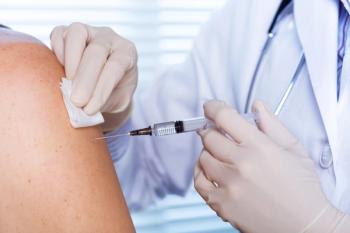
The panel of pneumococcal vaccination experts offer their concluding insights and perspectives on the current landscape of pneumococcal vaccines.

The panel of pneumococcal vaccination experts offer their concluding insights and perspectives on the current landscape of pneumococcal vaccines.

The key opinion leaders explore effective methods for educating patients about pneumococcal vaccination, highlighting its importance and benefits, while also addressing the impact of COVID-19 on vaccine hesitancy and potential fatigue in the general population.

The panel explores potential barriers to administering newer pneumococcal vaccines, such as payer coverage and patient concerns, while also discussing effective strategies for patient education and emphasizing the necessity and benefits of pneumococcal immunization.

The key opinion leaders examine the recent approval of PCV21, assessing its potential influence on pneumococcal vaccination strategies, while also identifying and discussing current unmet needs in the field of pneumococcal vaccination.

The vaccination experts analyze the impact of currently approved pneumococcal vaccines on otitis media prevention and compare the newer conjugate vaccines (PCV15 and PCV20) to their predecessors in terms of strain coverage and clinical efficacy.

Key opinion leaders examine the pivotal clinical data that supported the FDA approvals of PCV15, PCV20, and PCV21, while also explaining the differences between polysaccharide and conjugate pneumococcal vaccines in terms of their induced immune responses and the durability of protection they offer.

The medical experts explore the importance of receiving PCV20 following PCV13 and PPSV23 vaccinations, while also delving into the broader discussion of how sequential administration of these pneumococcal vaccines may potentially enhance protection against targeted strains.

The panel of experts examines the most recent ACIP recommendations for pneumococcal vaccination in adults aged 65 and older, highlighting key updates and changes to the guidelines.

Krista D. Capehart, PharmD, BCACP, FAPhA, Dr. Capeheart outlines the patient populations for whom pneumococcal vaccines are indicated and provides a detailed explanation of the ACIP-recommended immunization schedules for these vaccines.

The pneumococcal vaccination experts offer a comparative analysis of the five FDA-approved pneumococcal vaccines, focusing on their structural differences and the specific strains each vaccine targets.

The panel of healthcare professionals examines how strategic vaccination can effectively mitigate pneumococcal outbreaks, thereby reducing exposure risks to vulnerable populations in healthcare settings such as nursing homes and hospitals.

A medical professional examines the significant patient burden imposed by pneumococcal infections, highlighting how this burden drove the development of innovative vaccine technologies.

Key opinion leaders identify high-risk populations for invasive pneumococcal disease, explain the underlying factors contributing to their increased susceptibility, and offer strategies to improve suboptimal vaccination rates, particularly among historically underserved communities.

Medical professionals describe how pneumococcal disease manifests in adults, detailing its potentially lethal consequences such as sepsis or severe pneumonia, and explain how vaccination can effectively mitigate these serious health risks.

Medical experts outline the key indicators, symptoms, and transmission mechanisms of pneumococcal infections in adult populations.

Pharmacists are poised to address selective vaccination and counsel patients contemplating delaying, skipping, or seeking an alternate vaccine schedule.

A pharmacist’s role in the ambulatory care setting has traditionally included a review of medications for potential drug-drug interactions and adverse events, medication reconciliation, and the provision of counseling services.


Whereas traditional vaccines have used live or inactivated pathogens to elicit an immune response, mRNA is responsible for cellular processes, building structures, and more.

The COVID-19 pandemic serves as an important reminder of basic recommendations for ensuring health and wellness and protecting oneself against communicable disease transmission.

Pharmacists will likely encounter increased demand for the influenza vaccine during the 2020-2021 flu season because of the widely recognized value of this preventive health measure, and the anticipated continued circulation of the severe acute respiratory syndrome coronavirus 2.

Published: September 6th 2024 | Updated:

Published: October 18th 2021 | Updated:

Published: August 2nd 2024 | Updated:

Published: August 30th 2024 | Updated:

Published: September 6th 2024 | Updated:

Published: August 2nd 2024 | Updated: